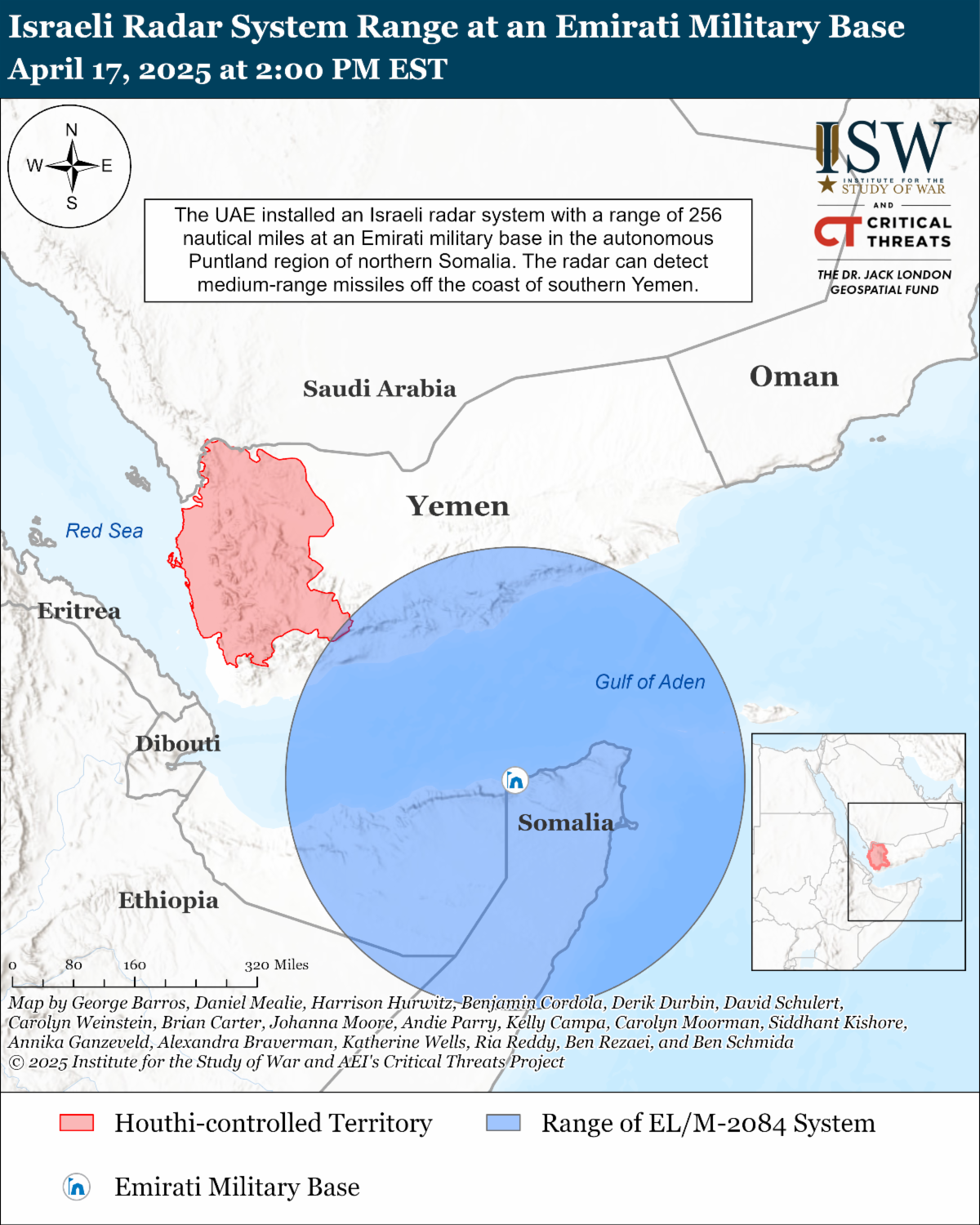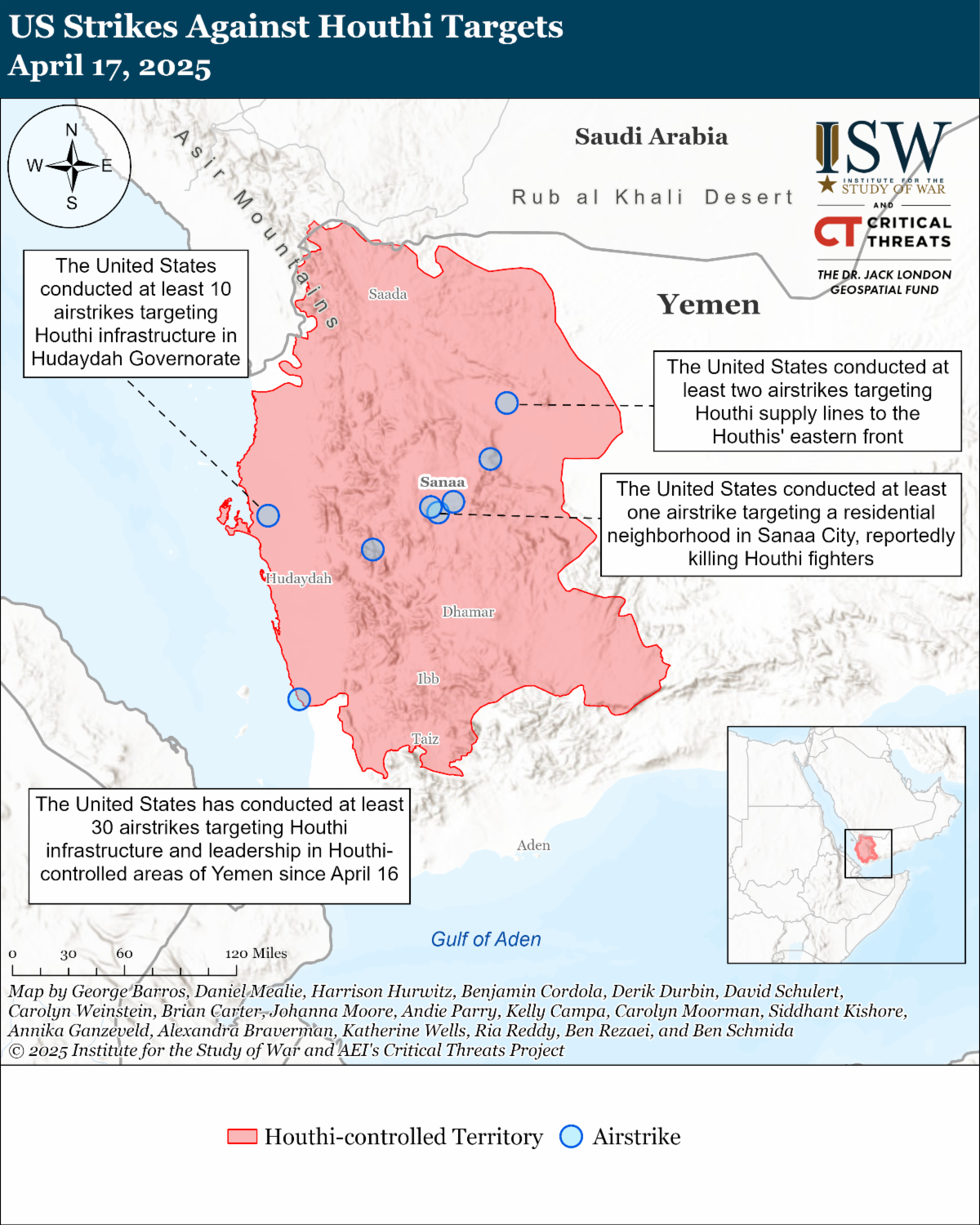Senior Iranian political and military officials, including Supreme Leader Ali Khamenei, met with Saudi Defense Minister Khalid bin Salman in Tehran on April 17. Saudi Arabia may seek to reassure Iran about its positions on a potential strike on Iran and a potential ground offensive against the Houthis in Yemen. Salman’s visit to Iran follows recent statements by senior Iranian officials threatening to attack any base “used by Americans” in a potential strike on Iran. These threats likely seek to discourage US partners in the Middle East, including Saudi Arabia, from supporting an attack on Iran. Iran previously threatened in October 2024 that it would attack Saudi energy infrastructure if Saudi Arabia supported an Israeli attack on Iran. Salman may have sought to reassure Iranian officials that Saudi Arabia would not support an attack on Iran.
Salman, accompanied by Saudi Ambassador to Yemen Mohammed al Jaber, may have also sought to reassure Iran that Saudi Arabia would not support a ground offensive against the Houthis in Yemen. Salman’s visit to Iran follows recent reports that some Gulf countries and anti-Houthi factions in Yemen are exploring the possibility of a Yemeni government ground offensive against the Houthis. Unspecified Saudi officials told Western media on April 14 that Saudi Arabia would not participate in a ground offensive. Iran views the Houthis as an integral part of the Axis of Resistance, particularly since Israel has significantly degraded other key members of the Axis of Resistance, including Hezbollah and Hamas.
A Chinese government-linked satellite company provided intelligence to the Houthis, according to US officials speaking to the Financial Times on April 17. This intelligence could support Houthi attacks against US vessels and commercial shipping, which demonstrates how the Houthis are continuing to cooperate with US adversaries to disrupt global trade. The US government raised concerns to the Chinese government about Chang Guang Satellite Technology Co., Ltd. (CGSTL) providing satellite intelligence to the Houthis. The Chinese government reportedly ignored these concerns. CGSTL has ties to the Chinese military through China’s military-civilian “fusion” program, which aims to integrate private sector work with military research and development, according to research done by a Washington-based security consulting firm. CGSTL’s provision of satellite intelligence to the Houthis is part of ongoing Chinese, Russian, and Iranian support to the Houthis. Houthi-owned military communications and domestic surveillance companies have reportedly imported Chinese-made communications equipment. Iran and Russia have provided targeting intelligence to the Houthis, which aids Houthi attacks on international shipping. The Yemeni coast guard and Omani customs have previously seized shipments of Chinese-made military equipment to the Houthis, such as hydrogen fuel cells for powering missiles and drone propellers. The Houthis reportedly told China and Russia in March 2024 that the Houthis would not target Chinese and Russian-flagged vessels transiting the Red Sea, according to several sources with knowledge on Houthi leadership discussions.
The United Arab Emirates (UAE) deployed an Israeli EL/M-2084 radar at the Emirati Bosaso military base on the coast of the autonomous Puntland region of northern Somalia. The UAE reportedly replaced an older radar system with the new EL/M-2084, which has a range of 256 nautical miles. The UAE could use this radar to detect various types of projectiles, including low-flying drones and high-altitude ballistic missiles, over the Gulf of Aden. The UAE could also use the radar to detect Houthi attacks on internationally-recognized Yemeni government targets, such as gas and oil export terminals in southern Yemen that the Houthis have previously targeted. These energy export terminals are the internationally-recognized Yemeni government’s economic lifeline. Key Takeaways:
- Saudi Defense Minister in Iran: Senior Iranian political and military officials, including Supreme Leader Ali Khamenei, met with Saudi Defense Minister Khalid bin Salman in Tehran on April 17. Salman may have sought to reassure Iranian officials that Saudi Arabia would not support an attack on Iran. Salman, accompanied by Saudi Ambassador to Yemen Mohammed al Jaber, may have also sought to reassure Iran that Saudi Arabia would not support a ground offensive against the Houthis in Yemen.
- China-Houthi Cooperation: A Chinese government-linked satellite company provided intelligence to the Houthis, according to US officials speaking to the Financial Times on April 17. This intelligence could support Houthi attacks against US vessels and commercial shipping, which demonstrates how the Houthis are continuing to cooperate with US adversaries to disrupt global trade.
- US Sanctions Relief for Syria: The United States reportedly asked the Syrian transitional government in mid-March to end Palestinian political and militia activity in Syria in exchange for partial sanctions relief. Syrian President Ahmed al Shara is unlikely to be willing or able to ban all Palestinian political activity in Syria but could agree to expel Palestinian militias from Syria in exchange for sanctions relief. The Iranian-led Axis of Resistance, which includes Palestinian militias such as Hamas and Palestinian Islamic Jihad, has sought to destabilize the new Syrian government and weaken the government’s control over Syria.
- Russian Cooperation with the Syrian Transitional Government: Russian President Vladimir Putin has continued to indicate that he seeks to develop stronger diplomatic and political relations with the Syrian transitional government. Russian President Vladimir Putin discussed Russian interests in Syria with Qatari Emir Tamim bin Hamad bin Khalifa al Thani in Moscow on April 17. CTP-ISW previously assessed that Russia might try to use economic incentives to secure basing rights in Syria.
| 





 [ISW] 러시아의 공세 캠페인 평가, 2025년 4월 17일
[ISW] 러시아의 공세 캠페인 평가, 2025년 4월 17일
 [ISW] 러시아 점령 업데이트, 2025년 4월 17일
[ISW] 러시아 점령 업데이트, 2025년 4월 17일